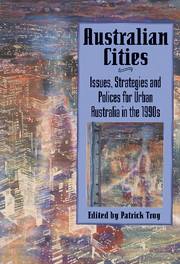Book contents
- Frontmatter
- Contents
- List of Figures
- List of Tables
- Preface
- Acknowledgements
- Note on Contributors
- Abbreviations
- Introduction
- Part I The Development and State of Australian Cities
- 1 Sustaining Suburbia: An Historical Perspective on Australia's Growth
- 2 The Urban Debate: From ‘Los Angeles’ to the Urban Village
- 3 National Urban Policy in the 1990s
- 4 Households, Consumerism, and Metropolitan Development
- Part II Current Policies and Options
- Part III Avenues for Development
- References
- Index
4 - Households, Consumerism, and Metropolitan Development
Published online by Cambridge University Press: 03 May 2011
- Frontmatter
- Contents
- List of Figures
- List of Tables
- Preface
- Acknowledgements
- Note on Contributors
- Abbreviations
- Introduction
- Part I The Development and State of Australian Cities
- 1 Sustaining Suburbia: An Historical Perspective on Australia's Growth
- 2 The Urban Debate: From ‘Los Angeles’ to the Urban Village
- 3 National Urban Policy in the 1990s
- 4 Households, Consumerism, and Metropolitan Development
- Part II Current Policies and Options
- Part III Avenues for Development
- References
- Index
Summary
A valuable though unintended consequence of the important debate now under way on the future of Australian cities, particularly on how to plan metropolitan areas, is the way it has highlighted how little we know about the role played by households in urban development. Surprisingly little is published on the household's place in urban social structures, both in Australia and elsewhere, and even less is available on the way households act as a force to help form and transform cities and towns. With the household being the major institution upon which ‘social’ (as against ‘economic’ and ‘political’) aspects of urban growth and change are based, knowing little about this institution inevitably thwarts a fuller understanding of urban development and this, in turn, blocks the formulation of more adequate urban planning.
Such ignorance is particularly disconcerting at this time because the current debate on Australian cities cites the actions of households as a major cause of today's urban problems. This is especially apparent in the urban consolidation debate, where advocates of the policy are expressing alarm at the continuing movement of large numbers of households to the metropolitan fringe and at their disinterest in living in well-established, well-serviced, but depopulating, inner and middle suburbs.
- Type
- Chapter
- Information
- Australian CitiesIssues, Strategies and Policies for Urban Australia in the 1990s, pp. 87 - 110Publisher: Cambridge University PressPrint publication year: 1995
- 10
- Cited by



